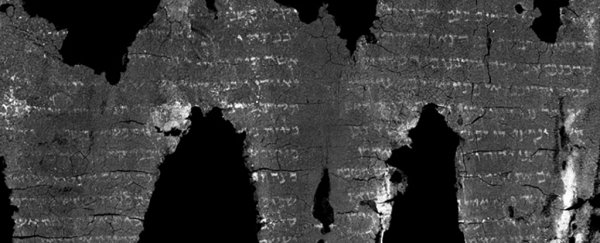Scientists have used new high-resolution imaging techniques to virtually 'unwrap' an ancient Biblical text that's been reduced to lump of charcoal.
Within the virtually unfurled En-Gedi scroll, researchers discovered a very early copy of the Book of Leviticus, and have confirmed that it also contains the earliest known copy of a Pentateuchal book - the first five books of the Bible.
"This work opens a new window through which we can look back through time by reading materials that were thought lost through damage and decay," said lead researcher Brent Seales from the University of Kentucky.
"There are so many other unique and exciting materials that may yet give up their secrets - we are only beginning to discover what they may hold."
There are three stages to the virtual unwrapping technique used by Seales and his team.
First, a three-dimensional, volumetric scan is made of the document, identifying each individual layer inside the text, like swirls in a fingerprint.
Then a second scan is taken, this time looking for very bright pixels that correspond to iron or lead-based ink. Using this information, the scan is able to figure out what's been written on the surface of the scroll without ever actually seeing it.
The final stage - flattening - is where the 3D scan is stretched out into a 2D shape so it can be read.
The whole process focusses on a small section of the scroll each time, to ensure the most accurate results. Right at the end, these fragments are put together like a jigsaw on the screen.
Before this technique was developed, Seales and his team were only able to see the first eight verses of Leviticus on the crumpled-up scroll.
The document, which is thought to be more than 1,500 years old, had been badly burned at some point in history, meaning historians couldn't risk opening it by hand.
And even if the document could be unfurled, the burns would make visually deciphering the text all but impossible.
But now, thanks to the virtual unwrapping, the text has been revealed, and experts can carry out a full critical analysis on its contents.
The discovery of text in the En-Gedi scroll absolutely astonished us," said one of the team, Pnina Shor, curator and director of the Israel Antiquities Authority's Dead Sea Scrolls Project.
"We were certain it was a shot in the dark, but the most advanced technologies have brought this cultural treasure back to life."
The research has been published in Science Advances.

